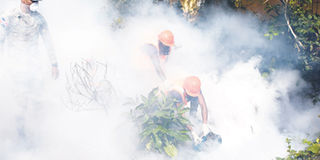What Tanzanians need to know about Zika fever

Dominican Air Force personnel fumigate various locations in Santo Domingo against the Aedes aegypti mosquito, vector of the Zika virus, on January 23. PHOTO|AFP
What you need to know:
The Zika virus, which was isolated from monkeys in Uganda about 70 years ago, has prompted worldwide concern after it recently began spreading very fast in the Americas.
Dar es Salaam. The government’s directive to all doctors in Tanzania to keep a sharp eye on the threat of the Zika virus has come at a time when the public is less informed of many issues about the mosquito-borne illness.
The Zika virus, which was isolated from monkeys in Uganda about 70 years ago, has prompted worldwide concern after it recently began spreading very fast in the Americas.
In the 1980s, the virus was also isolated in humans in Tanzania, Central African Republic, Egypt, Gabon, Uganda, Sierra Leone as well as in parts of Asia, according to studies done over the years and published in various journals.
Now the World Health Organisation (WHO) is estimating that at least 3 to 4 million people across the Americas will be infected with the virus in the next one year.
In Tanzania, the government said yesterday it would monitor the disease, advising people to stay put and rush to the hospital any time they experience symptoms of the disease.
But according to a survey carried out yesterday by The Citizen, not many people in Tanzania are informed about the health risks, signs and symptoms and how to keep away from being infected by the virus.
Here are the things you need to know about Zika:
What is Zika and why should people be concerned about it?
The Zika virus is in the same family as the yellow fever virus, West Nile, chikungunya and dengue —strains that are also prevalent in Tanzania. But unlike some of those viruses, there is no vaccine to prevent Zika or medicine to treat the infection.
Zika has now gained worldwide attention because of its alarming connection between the virus and a neurological disorder that results in babies being born with abnormally small heads. This causes severe developmental issues and sometimes death.
Reports show that since November last year, Brazil has seen 4,180 cases of microcephaly in babies born to women who were infected with Zika during their pregnancies.
How is the virus transmitted and what are the symptoms?
When an Aedes mosquito bites a person with an active infection, it picks it and then spreads the virus by biting other humans. These other humans become carriers during the time they have symptoms.
In most people, symptoms of the virus are mild, including fever, headache, skin rash and possible pink eyes. In fact, 80 per cent of those infected never know they have the disease.
That, according to doctors, is especially more of a concern in pregnant women, as this virus has now been shown to pass through amniotic fluid to the growing baby.
“What we now know,” said Dr Lyle Petersen, director of the Centre for Disease Control’s Division of Vector-Borne Diseases, “Is that fetuses can be infected with the virus. That’s not new for infectious diseases, but it is new for this virus.”
In addition, the CDC says there have been documented cases of virus transmission during labour, blood transfusion, laboratory exposure and sexual contact. While Zika has been found in breast milk, it is not yet confirmed it can be passed to the baby through nursing.
Where is the Zika virus now?
The Zika virus is now being locally transmitted in Barbados, Bolivia, Brazil, Cape Verde, Colombia, Dominican Republic, Ecuador, El Salvador, French Guiana, Guadeloupe, Guatemala, Guyana, Haiti, Honduras, Martinique, Mexico, Panama, Paraguay, Puerto Rico, Saint Martin, Suriname, Samoa, the US Virgin Islands and Venezuela, says the CDC.
What can you do to protect yourself against Zika?
Because there is no treatment or vaccine available, the only protection against Zika is to avoid travelling to areas with an active infestation.
If you travel to a country where Zika is endemic, the CDC advises strict adherence to mosquito protection measures: Use approved repellents over sunscreen, wear long pants and long-sleeved shirts thick enough to block a mosquito bite, and sleep in air-conditioned, screened rooms, among others.
How do we keep away mosquitoes with Zika.
If you have Zika, you can keep from spreading it to others by avoiding mosquito bites during the first week of your illness, says the CDC. The female Aedes aegypti, the primary carrier of Zika, is an aggressive biter, from daytime to dusk and indoors to outdoors. Keeping screens on windows and doors is critical to preventing entry to homes and hotel rooms.
What’s being done to stop Zika?
Globally, researchers are hard at work in laboratories trying to create a Zika vaccine. A clinical trial for a Zika virus vaccine could begin this year, according to Dr Anthony Fauci at the CDC.
Until those efforts bear fruit, health officials are implementing traditional mosquito control techniques such as spraying pesticides and emptying standing water receptacles where mosquitoes breed
The Pan American Health Organization (PAHO), the regional office of the WHO has already advised people to protect themselves from the mosquitoes, which also spread dengue fever and chikungunya.
In Tanzania, the Ministry of Health, Community Development, Children and the Elderly says that local authorities are monitoring the entry points while the government would work on curbing the spread of the virus to Tanzania, as per the WHO guidelines.




